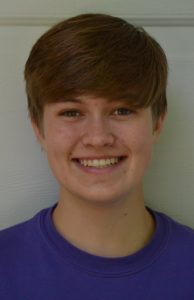On February 4, 2019, I was in class at Urbana High School when a student came in and said there were students fighting in the hall and a teacher had been knocked out. My teacher quickly locked the door and we waited until all students were released from classes at 1:20 p.m. We watched in anticipation as police cars from across the county, fire department vehicles, and ambulances lined up outside our school. I knew that I was safe, but I did not know what was happening outside my classroom. Later we would learn that a fight had broken out in the lunchroom and moved into the hallway, and that several students and a parent had been arrested.
In the aftermath of the fight there was a greater emphasis put on ensuring student and staff safety. In an effort to do this, and to quiet the nerves of anxious parents, the Urbana School Board voted to employ two full-time police officers, who would be allowed to display their weapons while inside the Middle and High Schools. I find this both a gross mistake and a violation of human rights.
I came to this conclusion over the past winter while taking a course in human rights that made me think a lot about the events of my senior year at Urbana High. As I read the United Nations Universal Declaration of Human Rights, I thought about how these rights are present in my life—especially the right to education. The Declaration articulates that everyone has the right to education, and states that “[e]ducation shall be directed to the full development of the human personality and to the strengthening of respect for human rights and fundamental freedoms. It shall promote understanding, tolerance and friendship among all nations, racial or religious groups, and shall further the activities of the United Nations for the maintenance of peace.”
The installation of additional police in Urbana High and Middle Schools is not in alignment with this right. A police presence does not promote understanding, tolerance or peace, but instead impedes it. The use of police as authoritative figures demolishes the development of understanding in conflicts, because they represent a position of power that can overpower any cooperative talking. They will prevent students from building the tolerance and communication skills necessary for a healthy society. As a student I am intimidated by police and am less likely to try and take part in dialogue under police supervision, because their presence says to me, “if you make a mistake there could be legal consequences.” This climate of fear is clearly not compatible with the vision of education described in the Declaration of Human Rights.
Some argue that an additional police presence in the schools is the best way Urbana can protect access to education. I understand the desire to keep children safe. The right to life and security is also a part of the UN declaration. But this view sees education as a privilege to be earned, however, not a right, and what this approach ignores is the role of social and class standing in one’s perception of that police presence.
Armed police do not instill a sense of safety in all; race and class play a role in how students react to police. Many children, including myself, are afraid of the police. If and when I saw a police officer in the halls of Urbana High School I would become nervous and wonder what was happening that brought the police to school. That same police presence might bring a sense of security to some parents who are comforted by the symbol of authority sent into the school to keep their child safe—but at what cost to another parent’s child?
Last year, when the police showed up at Urbana High to deal with the fight, not a single student in the class I was in felt safer with the police there. We were all more afraid. “What could have happened to cause so many police to show up to our school?” A police presence will only contribute to eroding social trust.
I had an excellent education through the Urbana schools, and I look back on my time there fondly. However, I realize that not everyone had the same opportunities as I did, and I am incredibly privileged and fortunate to have gotten such a strong education. I believe that Urbana schools can offer the same caliber of education I received to every student, but I do not believe that creating a sense of fear in students by adding more police to schools will support this. Students have a right to schools that promote learning, not fear.

Cara Munro is a graduate of Urbana High School, now studying marine biology at the University of California, Santa Cruz.
1,926 total views, 1 views today
